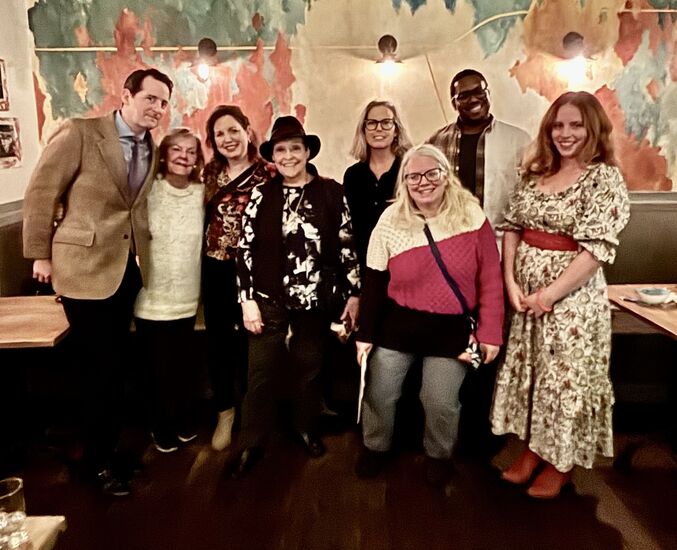- Connie Roberts.
Connie Roberts started reading old copies of Irish newspapers from the 1950’s and 60s, looking for stories about what happened when she was a child and living with her parents and 14 brothers and sisters.
She saw one in the Offaly Independent about her father receiving jail time again for battery against her mother.
All of this is material for Roberts’s book called “Not the Delft School,” and although it is unpublished at the moment, it is the sort of poetry we haven’t seen the likes of in a long time.
Much of it, a memoir in verse, is inspired by having to spend her childhood growing up in an industrial school in Ireland in the late 1960s and ‘70s; part of it is about witnessing many nights of domestic violence as a young girl.
Her mother had 15 children and all of them would grow up in Irish industrial schools.
In 1968, at the age of 5, she was turned over by the courts to the nuns at Mount Carmel Industrial School in County Westmeath. She would be kept there until she was 17.
The author, an Irish-born poet and writer out of County Offaly, has that rare gift of writing that doesn’t come along too often. Like other powerful poets before her in Ireland, it’s a mystery where their voices come from.
My guess is that it’s born somewhere in the silence of the lonely stretches of the Irish bogs that Seamus Heaney wrote about.
Her writing carries the weight of Brendan Behan with it, the weight of the McCourt brothers out of Limerick, and even some of the loneliness of Alan Sillitoe. But she clearly has her own voice. In a poem about a doll that was taking away from her in the industrial school her words bring you down the hallways of that dreaded place with her.
“The Closet”
In the linoleum corridor, next
To the cassies which held our
polished shoes
And aprons, it vanished into
the wainscot
Paneling. But we knew where it was.
Whose toy hadn’t been confiscated
and stored
There for safe-keeping after a visit
With a family---my Lucille Ball doll,
With her red-bouffant curls
and mischievous smile,
Shelved for years, her unblinking blue eyes twinkling….
In 2001, she was a finalist in Ireland’s Strokestown International poetry Contest. Then in 2010, she won Ireland’s Patrick Kavanagh Poetry Award.
The two of us spent a winter Saturday afternoon not long ago in Paddy’s Loft, a pub on Hicksville Road in Massapequa, talking about Mount Carmel industrial school.
“The industrial schools got a little bit better in 1970 when the government investigated and the Kennedy Report came out,” she said. “Still, Mount Carmel was a big institution, you know, and it was rough. You were afraid a lot.”
She has a sharp wit about her, she knows words well, and she is quick with a smile, but her eyes reflect the hurt of the years she saw when you ask her to go into some of the details for you.
Roberts’s work is filled with such graphic, emotional images, that she is often asked to explain the history behind some of the poems. She would rather not do that, rightfully thinking that the work stands for itself. And in that work she has even managed to capture fleeting moments of happiness in her childhood.
She makes it very clear to you that she doesn‘t want to “become the poster girl for industrial schools.” That’s not for her. “I have no bitterness. I survived,” she said. “And that is the part I try to unravel about my past. How did I survive? What did I use? Part of it I think is that I always felt that I didn’t belong there. I was a quiet kid, I toed the line, but I always felt, I don’t belong here.”
“Acceptance”
When the nun took us for our
Sunday walk
Out the Old Bog Road, I’d lag behind
Or sprint ahead, not wanting
to be branded
An orphan….
After Roberts was discharged, she made her way to Dublin and found some secretarial work. In 1983, with some connections from a brother who lived in New York, she immigrated to America where her life would become like a lyric out of a Black 47 song.
“Coming to America, oh my God, it reinvented me. I loved the anonymity of New York. Nobody’s asking ‘who’s your father, where’d you come from?’” she said.
She got a job as a waitress at Tommy Makem’s Irish Pavilion on East 57th Street. “I had the weekends off, and I used to walk up to the Metropolitan Museum of Art on Sundays. I would sit on the steps and eat my ice cream, or I would sun myself on the grassy banks beside it. But I never walked through the doors. That wasn’t for me; that was for the educated.
“I didn’t question it at the time, but I look back on it now, and I think, ‘why the hell didn’t I go through those doors? ’ You know? I didn’t have the esteem, the confidence. It’s just one of the byproducts of growing up in an industrial school,” she said. “That’s what the education gave me. It gave me a key to the Met.”
Today, Roberts teaches creative writing at Hofstra University on Long Island, and is part of Hofstra’s Irish Studies Program.
In the early 1990s she returned to the Mount Carmel Industrial School with her husband Pete Hennigan. She wanted to show him the building she grew up in that was an Irish orphanage dating back to 1875. But it was all boarded up. They were getting ready to knock it down.
She took pictures, and soon the place that held behind its doors most of the memories of her childhood would be turned into dust as if it never existed.
Someone directed them to a nun living in a nearby house who had been at Mount Carmel in the years she was there. She said she was one of the nuns she remembers as a decent person, and she has stayed in contact with her.
They had tea together, and the nun handed her an old wall tile from the kitchen of the orphanage. It was a square brown tile about a half-inch thick, with a mustard colored flower on it.
“She had saved it from the wrecking ball,” Roberts said. “I can’t tell you how much I treasure it. It marked the beginning of my acceptance that I had spent my childhood in an orphanage. It helped open the poetry floodgates, because shortly thereafter, I started exploring my past in a poetry class.”










